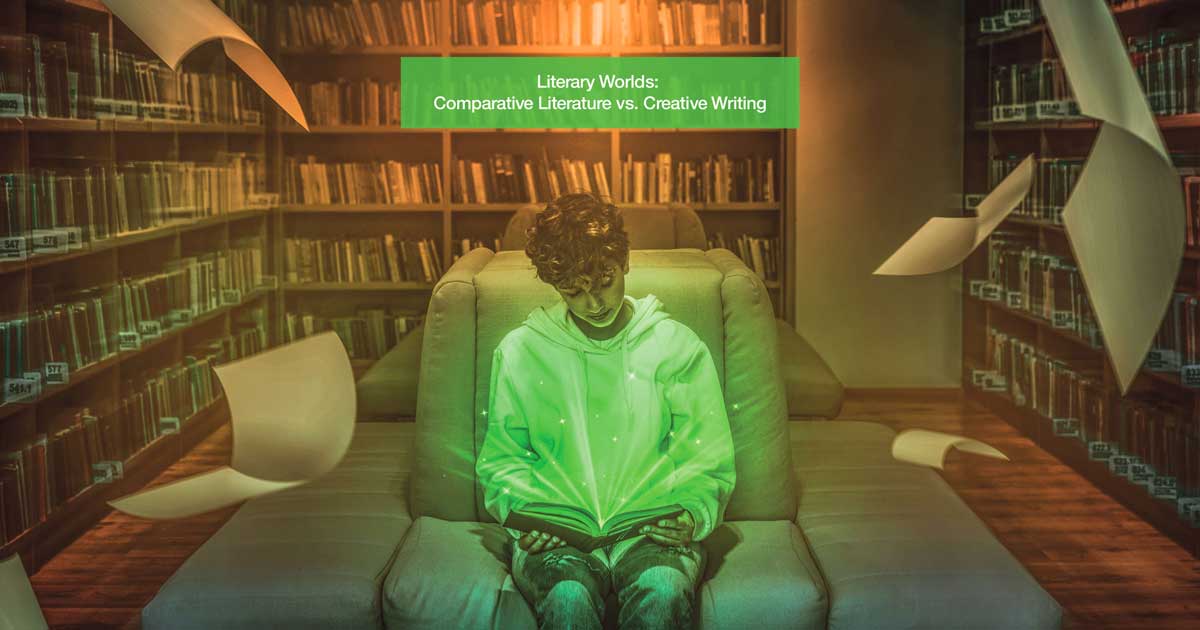Blog Detail


Literary Worlds: Comparative Literature vs. Creative Writing
15-04-2024

The world of literature is vast and empowering, and the specialisations available for courses these days are impressive too. Literature opens a window to the broader spectrum of the world celebrating the written work reflecting the different ages and sheer talent of people from all eras. Comparative Literature and Creative Writing are two of the many other popular and prominent academic courses available at different educational levels. These courses are knowledge-enriching and empowering in several prospects. The widely celebrated literary world of education is career promising too, making the subjects indeed a sensation amongst college-goers and fresher graduates from school.
Comparative Literature vs. Creative Writing: Course Duration and Eligibility
Comparative Literature has been designed as a full-fledged bachelor's course with the provision to study further at a master’s and MPhil ranking. In contrast to this, creative writing has mostly been designed for certification and diploma courses.
Candidates who have completed their 12th schooling or equivalent studies can join for both the courses. For a master's programme in Comparative English, the student is expected to have completed a bachelor’s degree in English Language or Literature with a university-accepted aggregate.
The course duration for the discussed programmes is as follows:
BA. Comparative Literature: 3 years
MA. Comparative Literature: 2 years
MPhil. English Language and Literature: 2 years
Diploma in Creative Writing: 6 months to 18 months
Certification courses in Creative Writing: 3 months to 12 months
Comparative Literature vs. Creative Writing: Course Curriculum
The course curriculum for the bachelor’s programme in Comparative Literature has been carefully curated after understanding the subject value and the career skillset. Further, the course structure gives a detailed insight into the olden English era and reflects historical aspects, writing styles and more.
Creative writing certifications and diploma programmes have majorly been designed for career-oriented candidates. The courses are inclusive of industrial skill development and working on newer media and communications trends.
Subjects included in Comparative Literature: Ancient and Medieval Literature, An Introduction to Comparative Indian Literature, Ancient and Medieval Literature, An Introduction to Linguistics and Translation Studies, History of Literature, Language Learning, An Introduction to Literary Theory and Criticism, Reception of Ancient and Medieval Literature, Dalit and Adivasi, Tribal Literature, Women Writing in India, Comparative, Methodology of Reading, Indian and Non-Indian Contexts, Literary Genre, Partition and Diasporic Literature, Performance and Indian Literature, and language Situations in India.
Subjects included in Creative Writing: Basics of writing a book, Writing a novel outline from scratch, Creative writing non-fiction, Copywriting, SEO writing, Popular digital marketing practices, and Basics of Content Writing.
Comparative Literature vs. Creative Writing: Career Opportunities
Career options for students after opting for Comparative Literature
- Advertising account executive: Bridges the gap between the agency and client and coordinates the entire project.
- Community organiser: Engaged in organising community art events and programmes.
- Legislative assistant: Engaged in drafting content for various case files and documentation works.
- Public relationsCopywriter: Writes content for PR articles for marketing and press-release purposes.
- Screenwriter: Engaged in drafting creative and interesting stories for marketing and entertainment industries.
- Academician: Works in colleges and schools engaging in teaching, researching and providing assistance to students.
Career options for students after opting for Creative Writing
- Advertising copywriter: Writes scripts for ad campaigns and other marketing copies.
- Arts administrator: Manages the art exhibitions, and organisations and works towards its upliftment.
- Creative director: The role involves understanding industrial marketing and communication trends and creating visually and verbally impactful ad campaigns for increased revenue generation.
- Digital copywriter: Writes compelling and selling copies for various online platforms.
- Editorial assistant: Works closely with the editorial team of newspapers and magazines and contributes valuable insights to publish the best edition of the paper and magazines.
- Higher education lecturer: Works at an educational institution by rendering knowledge to students and guiding them in projects and research.
- Lexicographer: Works closely with a dictionary publishing team, and engaged in writing and editing the content on need.
- Magazine journalist: Engaged with finding interesting and timely relevant stories, conducts interviews, researches more on the selected niche and drafts articles and reports.
- Newspaper journalists: Cover stories and events from all around the district and state and are engaged in writing reports and articles on the same.
- Proofreader: The good flair of language, writing and grammar is put to use by finding mistakes and concerns from already written content before publishing.
- Talent agent: He/she is involved with finding the right talents in acting profiles, screenwriting, broadcast journalism and more.
- Writer: Engaged in writing various content profiles, from website content writer to scriptwriter, novel-writer and more.
In Short
Comparative Literature is undeniably an appropriate subject and field of study for students who are passionate about literature aspects. This also means the course is ideal for students who wish to delve deeper and celebrate the art of writing. Additionally, the course structure of comparative literature lets you explore and discover your field and niche of interest. Topping the same with creative writing courses will further enhance the candidate’s profile with an industry-ready skillset. Both the courses of BA. Comparative Literature and Creative writing certifications complement each other and promise the availability of challenging career profiles to learn and grow.